🐶 Miniature Poodle Hypoallergenic Guide ✅Character, Grooming & Suitability 🟢 Hypoallergenic Level: Excellent - Highly suitable for people with allergies
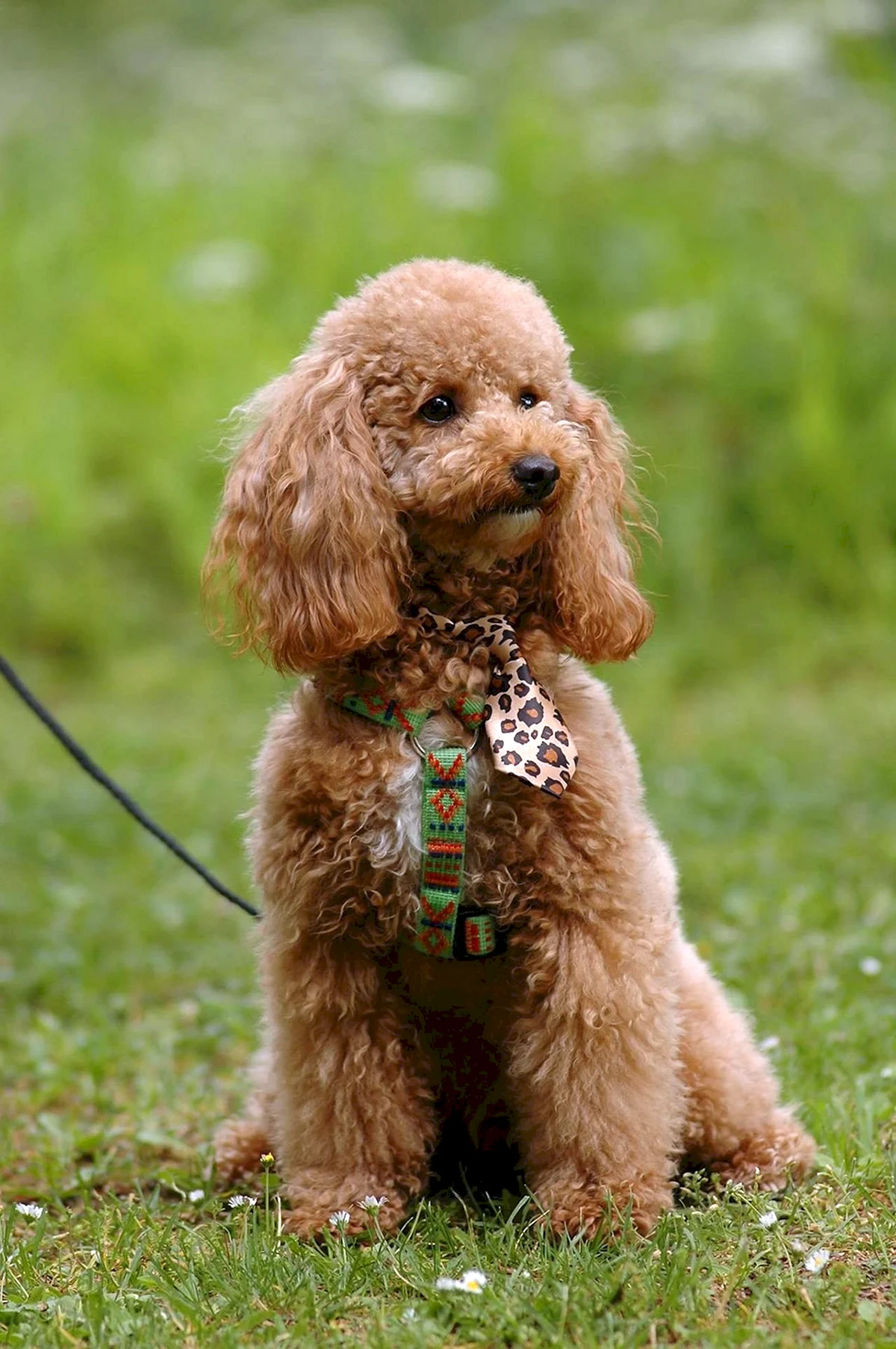
Elegant Miniature Poodle showcasing the breed's characteristic curly coat
🏷️ Key CharacteristicsEssential Breed InformationSize: Small to Medium
Height: 10-15 inches (25-38 cm) Weight: 10-15 lbs (4.5-6.8 kg)
Lifespan: 12-15 years
Colors: Black, White, Brown, Apricot, Red, Silver, Cream, Blue, Gray
Activity Level: High
Grooming Complexity: High maintenance
Hypoallergenic: Yes - Excellent
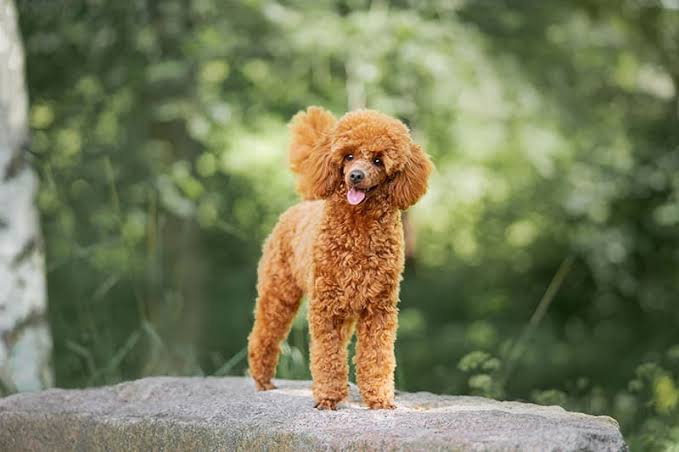
Miniature Poodle's coat flowing in the wind
🏛️ Origin & History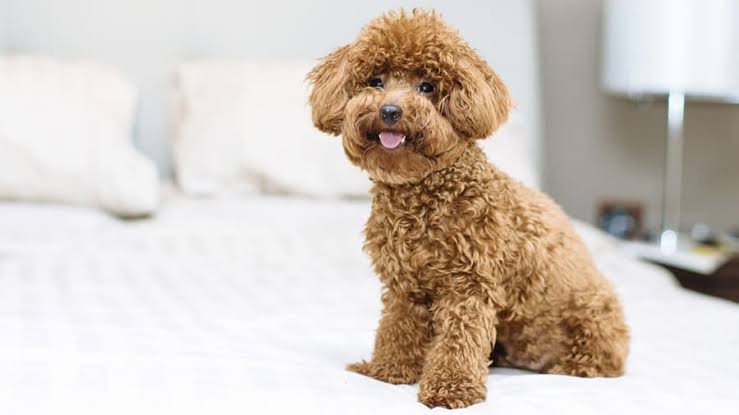
Comfortable Miniature Poodle relaxing indoors
The Miniature Poodle traces its origins to 15th and 16th century Europe, where it was developed as a smaller version of the Standard Poodle. Originally bred in Germany and France, these intelligent dogs were initially used as water retrievers for duck hunting. The breed's distinctive curly coat served a practical purpose, providing insulation in cold water while the traditional "poodle clip" helped reduce drag during swimming. During the 18th and 19th centuries, Miniature Poodles transitioned from working dogs to beloved companions of European aristocracy. Their intelligence, trainability, and hypoallergenic qualities made them particularly popular among the French nobility. The breed was officially recognized by the American Kennel Club in 1887 and has since become one of the most popular companion breeds worldwide. Today's Miniature Poodles retain their ancestors' high intelligence and athletic ability while being perfectly sized for modern living. Their development as a distinct size variety has created a dog that combines the Standard Poodle's excellent temperament with a more manageable size for families and apartment dwellers. 💕 Character & Temperament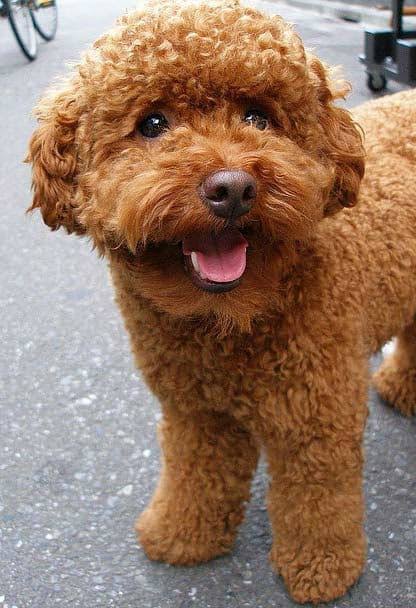
Joyful brown Miniature Poodle displaying the breed's cheerful nature
Miniature Poodles are renowned for their exceptional intelligence and eager-to-please attitude. Ranking as the second most intelligent dog breed, they excel at learning commands, tricks, and complex behaviors. These dogs form strong bonds with their families and are known for their loyalty and affectionate nature. The breed exhibits a playful and energetic personality combined with remarkable adaptability. Miniature Poodles are naturally social dogs that generally get along well with children, other pets, and strangers when properly socialized. They possess a confident demeanor and can be quite entertaining with their animated expressions and playful antics. While generally friendly, Miniature Poodles can be somewhat reserved with strangers initially but warm up quickly. They make excellent watchdogs due to their alertness, though they're more likely to bark than show aggression. Their sensitive nature means they respond best to positive reinforcement training methods and don't tolerate harsh treatment well. 👀 Physical Appearance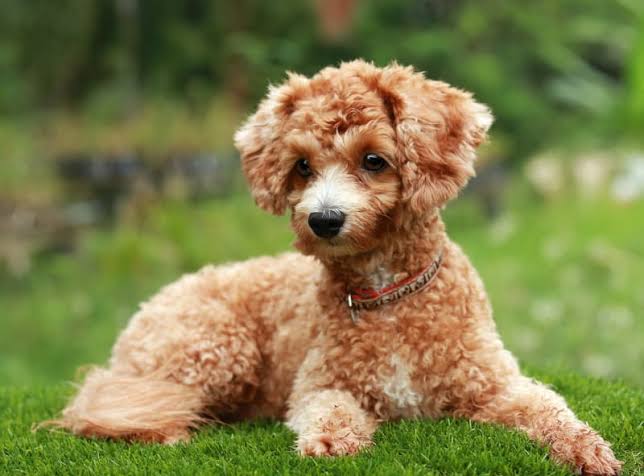
Miniature Poodle showing perfect breed proportions while relaxing
The Miniature Poodle presents an elegant, well-proportioned appearance with a distinctive curly coat that sets it apart from other breeds. Their body is square in profile, meaning the length from chest to rump approximately equals the height from withers to ground. The head is moderately rounded with a straight muzzle and dark, oval eyes that convey intelligence and alertness. 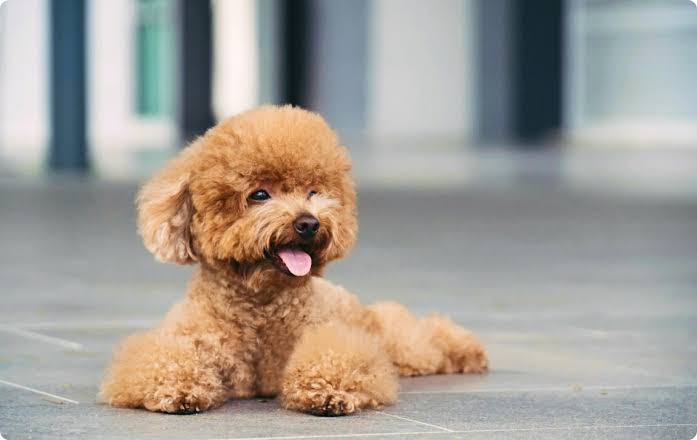
Beautiful apricot-colored Miniature Poodle outdoors
The breed's most notable feature is its dense, curly coat that comes in a variety of solid colors including black, white, brown, apricot, red, silver, cream, blue, and gray. The coat texture is woolly and non-shedding, making it ideal for allergy sufferers. Their ears are long and hang close to the head, while their tail is typically docked and carried high. Miniature Poodles move with a light, springy gait that demonstrates their athletic heritage. Their compact size combined with their sturdy build makes them both elegant and practical companions. The breed's expression is alert and intelligent, reflecting their keen mental capabilities. 🏃 Activity Needs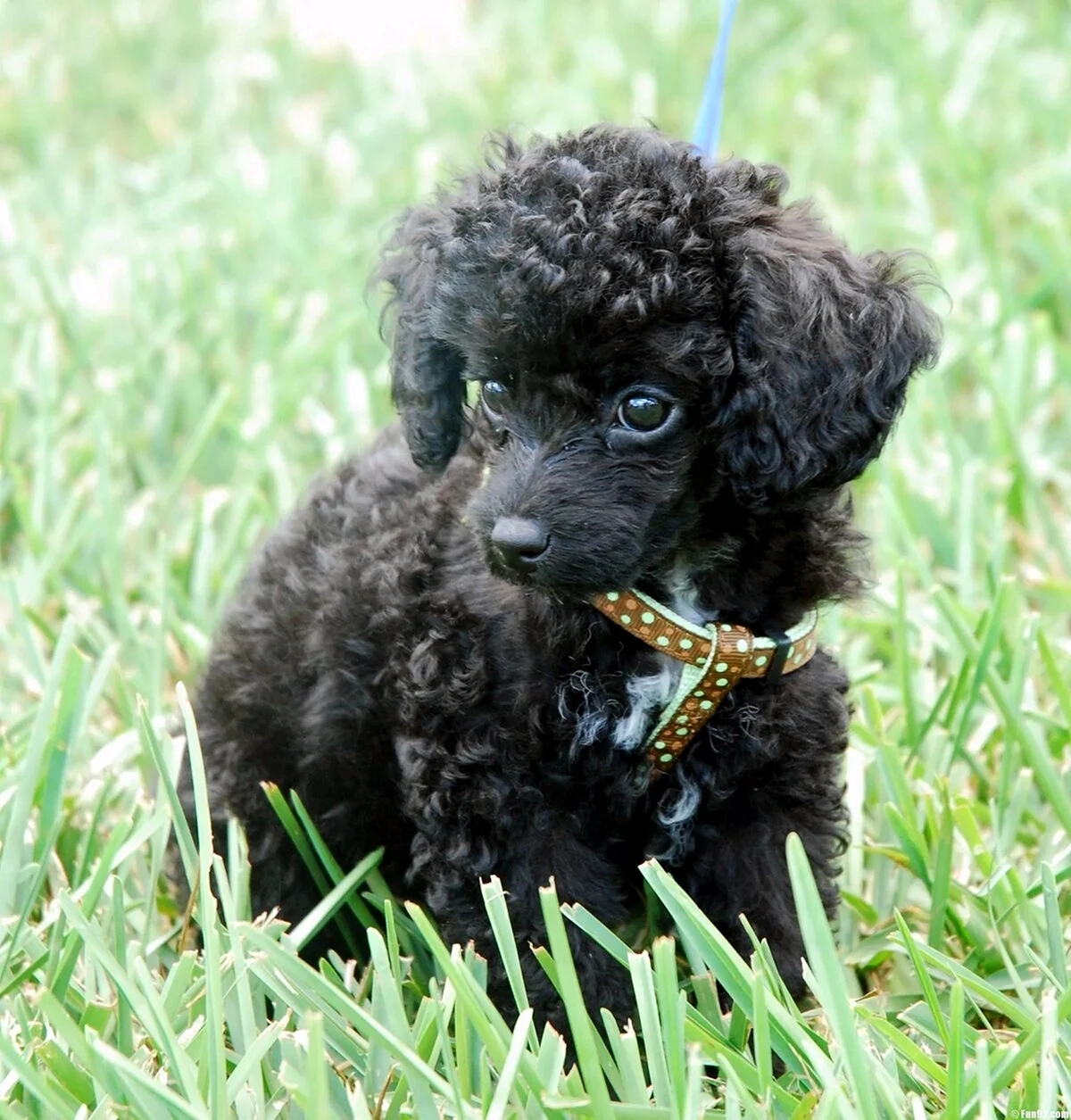
Young black Miniature Poodle ready for outdoor adventures
Miniature Poodles require moderate to high levels of daily exercise to maintain their physical and mental health. A typical adult needs 60-90 minutes of activity per day, which can be divided into walks, playtime, and mental stimulation activities. These energetic dogs enjoy various forms of exercise including brisk walks, swimming, and interactive games. Mental stimulation is equally important as physical exercise for this intelligent breed. Puzzle toys, training sessions, and problem-solving games help prevent boredom and destructive behaviors. Miniature Poodles excel at agility, obedience, and trick training, making these activities excellent outlets for their energy and intelligence. The breed adapts well to different exercise routines and can be content with indoor play during inclement weather. However, they thrive when given opportunities to explore new environments and engage in varied activities. Regular exercise helps maintain their cheerful disposition and prevents anxiety that can develop in under-stimulated Poodles. ✂️ Grooming Care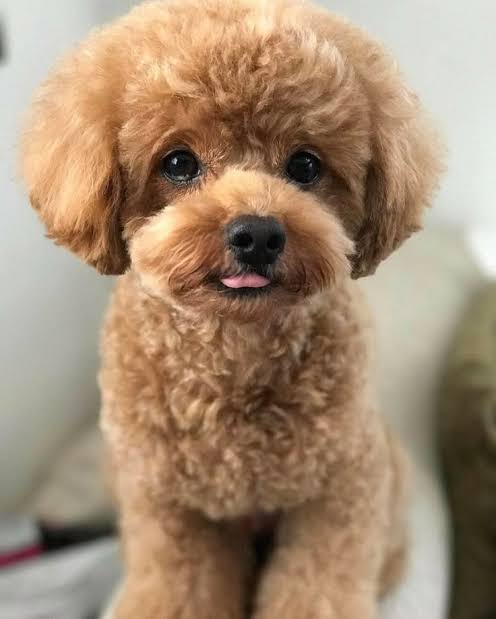
Professionally groomed apricot Miniature Poodle portrait
Miniature Poodles require extensive grooming maintenance due to their continuously growing, curly coat. Daily brushing is essential to prevent matting and tangling, as their dense coat can quickly become unmanageable without regular attention. Use a slicker brush and metal comb to work through the coat systematically. Professional grooming every 4-6 weeks is necessary to maintain the coat's health and appearance. Popular clips include the "puppy cut" for easier maintenance and the traditional "continental clip" for show purposes. Between professional visits, owners should trim hair around the eyes and ears to prevent irritation and maintain hygiene. 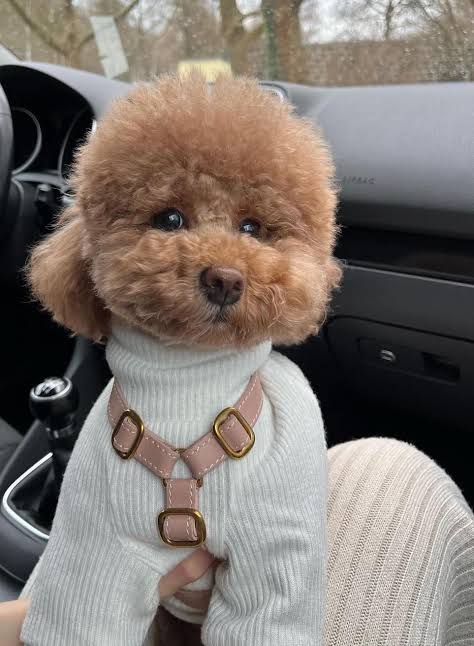
Well-groomed Miniature Poodle dressed for cooler weather
Regular nail trimming, ear cleaning, and dental care are crucial components of Miniature Poodle grooming. Their ears should be checked weekly and cleaned as needed to prevent infections. Bathing should occur monthly or as needed, using gentle, dog-specific shampoos that won't strip the coat's natural oils. 🍽️ Nutrition Needs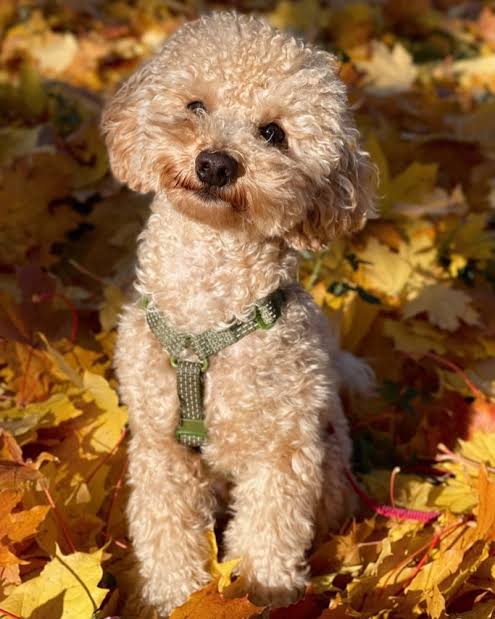
Healthy cream-colored Miniature Poodle enjoying autumn outdoors
Miniature Poodles thrive on high-quality, age-appropriate dog food that meets their nutritional needs throughout different life stages. Adult Miniature Poodles typically require 1/2 to 3/4 cups of dry food daily, divided into two meals to prevent bloat and aid digestion. The exact amount depends on the dog's age, activity level, and metabolism. Due to their active nature and high intelligence, Miniature Poodles benefit from diets rich in protein and omega fatty acids that support brain function and coat health. Look for foods with real meat as the first ingredient and avoid fillers like corn and wheat that provide little nutritional value. Monitor your Miniature Poodle's weight carefully, as the breed can be prone to obesity if overfed. Establish regular feeding times and avoid free-feeding. Treats should comprise no more than 10% of daily caloric intake and should be used primarily for training purposes. 🔍 Discover Your Perfect Hypoallergenic CompanionLooking for the ideal hypoallergenic dog breed that matches your lifestyle? Our comprehensive breed selector evaluates your specific requirements, living environment, and allergy considerations to suggest the perfect canine companion. Find which hypoallergenic breeds are ideal for your family in just 2 minutes! 👨👩👧👦 Suitable For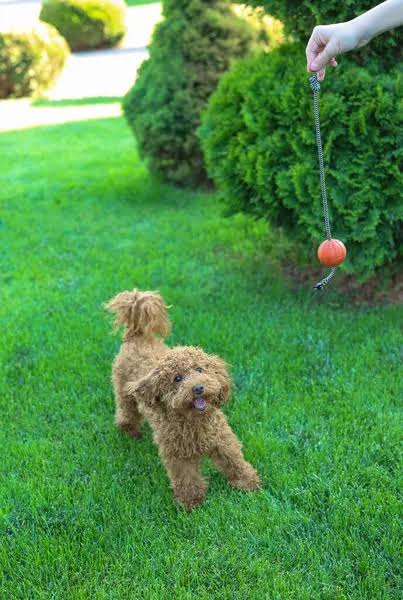
Playful Miniature Poodle enjoying interactive games
Families with ChildrenMiniature Poodles make excellent family companions and are particularly good with children who understand how to interact gently with smaller dogs. Their patient and playful nature makes them wonderful playmates, though supervision is recommended with very young children due to the dog's size. They're known to be protective of their family members and often form special bonds with children. Apartment LivingThis breed is exceptionally well-suited for apartment living due to their manageable size and adaptable nature. While they need regular exercise, they can meet most of their activity needs through indoor play and daily walks. Their minimal shedding is an additional advantage for indoor living, though their barking tendency should be considered in close quarters. Experience LevelMiniature Poodles are suitable for both experienced and novice dog owners, though first-time owners should be prepared for the breed's grooming requirements and exercise needs. Their intelligence makes training relatively straightforward, but consistency and patience are key. New owners benefit from puppy training classes and professional grooming guidance. ⚖️ Pros & Cons✅ Advantages
❌ Challenges
❓ Frequently Asked Questions🎯 Interesting Facts About Miniature Poodles• Intelligence Ranking: 2nd smartest dog breed according to canine psychologist Stanley Coren Are Miniature Poodles truly hypoallergenic?Yes, Miniature Poodles are considered one of the most hypoallergenic breeds available. Their curly, non-shedding coat traps dander and allergens rather than releasing them into the environment. However, no dog is 100% hypoallergenic, and individual sensitivity varies among allergy sufferers. How often should I groom my Miniature Poodle?Professional grooming should occur every 4-6 weeks, with daily brushing at home to prevent matting. The coat grows continuously, so regular trimming is essential for hygiene and comfort. Many owners learn basic maintenance trimming between professional appointments. Do Miniature Poodles bark a lot?Miniature Poodles can be moderate barkers, especially when alerting to visitors or unusual sounds. Early training and socialization help manage excessive barking. They respond well to "quiet" commands and positive reinforcement training methods. Are they good with other pets?Yes, when properly socialized, Miniature Poodles generally get along well with other dogs and cats. Their friendly nature and intelligence make them adaptable to multi-pet households. Early socialization is key to developing good relationships with other animals. What health issues should I watch for?Common health concerns include hip dysplasia, progressive retinal atrophy, epilepsy, and bloat. Regular veterinary checkups, maintaining proper weight, and choosing reputable breeders who health test their breeding dogs help minimize risks. How much do Miniature Poodles cost to maintain?Annual costs typically range from $1,200-$2,500, with grooming being the largest expense at $600-1,200 yearly. Other costs include food, veterinary care, supplies, and potential training or boarding expenses. Can Miniature Poodles be left alone during work hours?Adult Miniature Poodles can handle 6-8 hours alone with proper exercise before and after. However, they're social dogs that prefer company and may develop separation anxiety if left alone too frequently. Puppies require more frequent attention and shouldn't be left alone for extended periods. | |
|
| |
| Переглядів: 243 | | |
| Total comments: 0 | |
